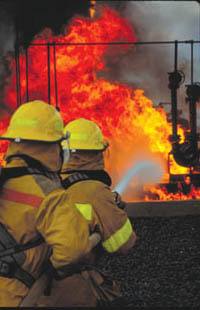
|
 |
 |
 Editorials | Environmental | January 2005 Editorials | Environmental | January 2005  
Mexico's Pemex Faces Infrastructure Woes
 Mark Stevenson - Associated Press Mark Stevenson - Associated Press

Alejandro Mendoza, a supervisor for Mexico's state-owned Pemex oil company, gazes out at a pipeline that dumped thousands of barrels of crude into the Coatzacoalcos river. "It's as old as I am," he notes. "It was built in 1976, the year I was born." Mendoza is in the prime of life, but the pipeline - and Pemex itself - is showing its age.

 Last week, environmental authorities closed a pipeline and a gas well and threatened to shut down more facilities. Last week, environmental authorities closed a pipeline and a gas well and threatened to shut down more facilities.

Beset by diminished reserves, scandals, accidents and opposition to almost every reform, the company formally known as Petroleos Mexicanos seems frozen in time.

Created out of a nationalization of the oil industry in 1938, it hasn't built a refinery since 1976 - the height of the last oil boom - and its infrastructure is literally crumbling, causing spills like the one on Dec. 22.

A week later, on Dec. 31, thousands of gallons spilled from a pipeline in neighboring Tabasco state. A week after that, on Jan. 11, a gas well exploded in the nearby village of Tlacuilolapan.

No injuries were reported in the Jan. 11 blast, but four people were killed and more than two dozen burned in a June 2003 rupture and explosion of a pipeline farther west, in the town of La Balastrera.

"We've lost all confidence. We've lost all our peace of mind," said Sara Romero Reyes, whose husband, Diego Dominguez Arenas, has scarring across his face, arms and back from the 2003 explosion.

Asked what Pemex should do, Romero Reyes said, "They should just go away, take their pipelines, go."

In Tlacuilolapan, Josefina Bautista, a mother of eight, pointed to the gas well that exploded 200 yards from her house on Jan. 11, and said "We live in fear. We can't sleep at night."

Lina Roma Gonzalez, 62, recalled how her riverfront yard in Coatzacoalcos flooded with oil on Dec. 22. "You couldn't eat because the smell of the oil got into the food," Roma Gonzalez said. The spill injured hundreds of birds and other animals and shut down the fisheries for months to come. "You couldn't breathe because the fumes burned your throat."

It all marks a change from the traditional acceptance of the company along the Gulf coast, where Pemex traditionally has provided the best jobs.

"Pemex is a necessary evil. It harms us, but it is good for many people. It builds roads, hospitals, schools," said fishing cooperative leader Rosendo Quintana, 40, who expects about 1,000 fishermen will be out of work because of the spill.

Pemex Director Luis Ramirez Corzo acknowledged that "we have a very serious maintenance backlog." The company estimates it needs about $3 billion per year in maintenance for its 33,000 miles of pipelines, but gets only about a third of that, even as half the ducts reach the end of their 30-year design lifespan.

Jose Luis Luege, the attorney general for environmental protection, called the accidents "a giant warning light" and has threatened to shut down dangerous ducts even "if it means shutting down gasoline to half the country."

On Jan. 16, Luege's agency closed a corroded, aging export pipeline that spilled 3,000 gallons of oil in Tabasco on Dec. 31. The next day, his office ordered the Tlacuilolapan well closed because Pemex hadn't carried out environmental impact or safety studies.

Pemex hands over all its income to the government, which depends heavily on oil revenue. Congress returns some of the money to fund maintenance, but 85 percent of the 2005 budget is earmarked for badly needed exploration.

Damian Garcia, an environmental officer for Pemex's refinery division, said that the company can continue to patch the existing infrastructure, "but in the long run it's more expensive. Every emergency like this costs a lot of money."

Exploration is the top priority. "If we don't exploit potential deep-water reserves, within 10 years we could become an oil-importing nation," said Energy Secretary Fernando Elizondo.

The company is expected to produce 3.44 million barrels a day of crude oil in 2005, exporting about 1.9 million barrels a day at a projected average price of $27 per barrel.

But even with reserves down to about 18.9 billion barrels and production expected to start falling steeply in 2006, laws limit Pemex's ability to form alliances with private firms experienced in drilling the deep waters of the Gulf, where the biggest reserves are believed to lie.

And even outside the swamps of the Gulf coast, Pemex seems to flounder in a bureaucratic morass, with responsibility for ducts split between the company's divisions - refineries, gas, exploration and production.

"Nobody's in charge of the pipeline system. Nobody is accountable for it," said George Baker of the Houston newsletter Mexico Energy Intelligence.

Pemex also refuses to make maps of its pipeline system available to many other authorities, apparently because it fears thieves who frequently steal gasoline by tapping ducts.

And the company, accused of funneling money to the former ruling party's 2000 campaign, has other problems. In November, Raul Munoz Leos resigned as head of Pemex after accusations he borrowed company money to pay for his wife's plastic surgery and he agreed to give the oil workers' union nearly $700 million in benefits.

While the accidents have created a new sense of urgency, "most people think it (Pemex) reached a crisis level a while ago," said David Shields, an independent oil analyst in Mexico City. | 
 | |
 |



